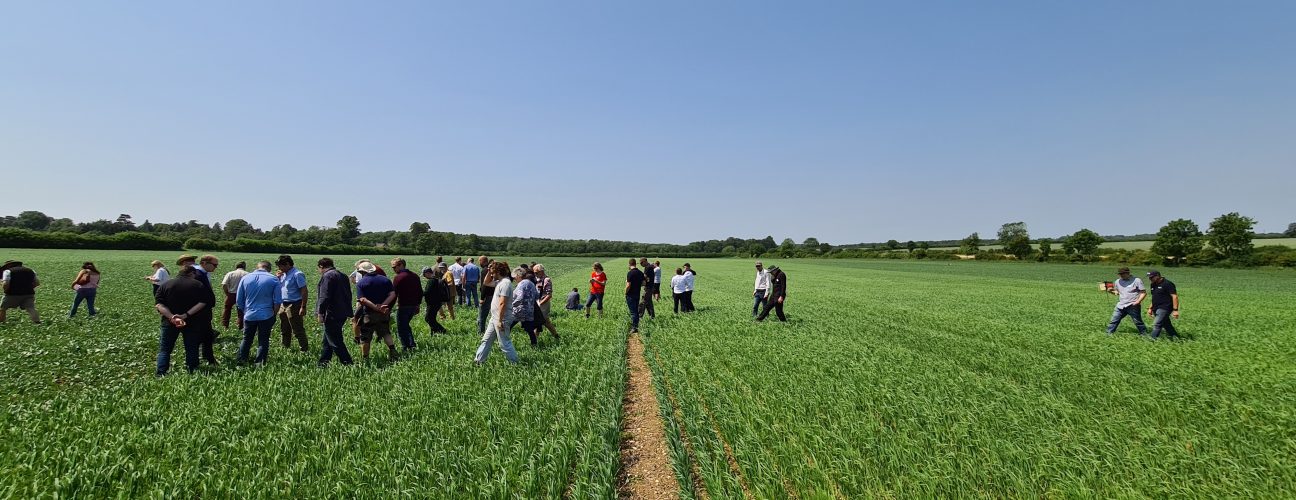Demo farm connectivity mission gathers momentum
The Sustainable Farm Networks initiative, linking diverse demonstration farm networks to meet to work together to improve communication between research, farm practice and food system policy, is gathering momentum. With 18 member networks that span supply chain, research project and natural capital farm groupings across all sectors and nations of the UK, over 1800 farm businesses and 175,000 Ha are represented so far- and more are joining each week.
Led by the Harper Adams School of Sustainable Food and Farming, the first gathering of SFN Network Stewards- the individuals with the personal oversight of individual farm demo networks- was held online on October 17th to identify and act on priorities in improving the reach and impact of the great work happening on the ground.

The challenges and satisfactions of setting about monitoring, measuring and ultimately evaluating the effects of coordinated farm practice change across multiple holdings- between three and 300- were discussed by diverse professional individuals who share day to day and project level experiences of network stewardship, but often operate in a unique and solitary role within their own organisations. The interrelatedness of diverse but integrated sustainability parameters including soil health, biodiversity, resilient productivity and input efficiency was a recurring theme as was the value of the lived experience of their farmer members. A chance to compare relative challenges of devolved legislative frameworks that differ between UK nations was also fully embraced.
We know that on farm demonstration works to inspire change- and inform policy- by giving a true picture of science in action, warts and all. The sharing of insights and findings between early adopters and the wider farming community, showing the reality, risks and at times unexpected benefits of taking up recommendations born of the UK’s world leading agricultural research is the starting point for much inspiration and genuinely informed action.
Opportunities for the group include mutual broadcasting of success stories to policy makers, and a wider farming audience, event and project planning coordination, coordination of metric use to give comparable and actionable data, training and skills support, improved access to technical resources events such as the December Soil & Water Conference, and strengthened links with the land-based curriculum through the Landex network of university and college farms. Most importantly, it is a forum where the collective voice of those working to drive an agricultural transition that is green, just and profitable can come together to learn from each other and be more than the sum of their parts.
Membership of the SFN is open to all demonstration farm networks, which we’ve defined as ‘3 or more farm businesses coordinating activities to implement in common practices, principles or technologies to enhance economic, social or environmental sustainability, with the intention of monitoring and disseminating the resulting collated findings, experiences or information’.
By working with Network Stewards – the individual(s) with the most direct and consistent contact with farms in the network- we will identify and facilitate opportunities for mutual support, collaboration and cooperation to enhance the experience and impact of the farmers they are working with. The SFN is a free to join, pre-competitive, system agnostic forum.
Working with existing knowledge exchange platforms such as Agricology and FarmPEP to amplify successes and highlight challenges, the SFN is shaped by its members, with the support of a steering group representative of supply chain pioneers, farmers, land-based skills providers, research project groupings and environmental certification organisations. Together they have helped us develop a Terms of Reference which lays out the aims, purpose offer and ask of joining networks.
If you think the SFN could be a good fit for a network you are involved in, ask your Network Steward to get in touch with lbates@harper-adams.ac.uk and/ or fill in their contact and network information through this link or by scanning this QR code:

